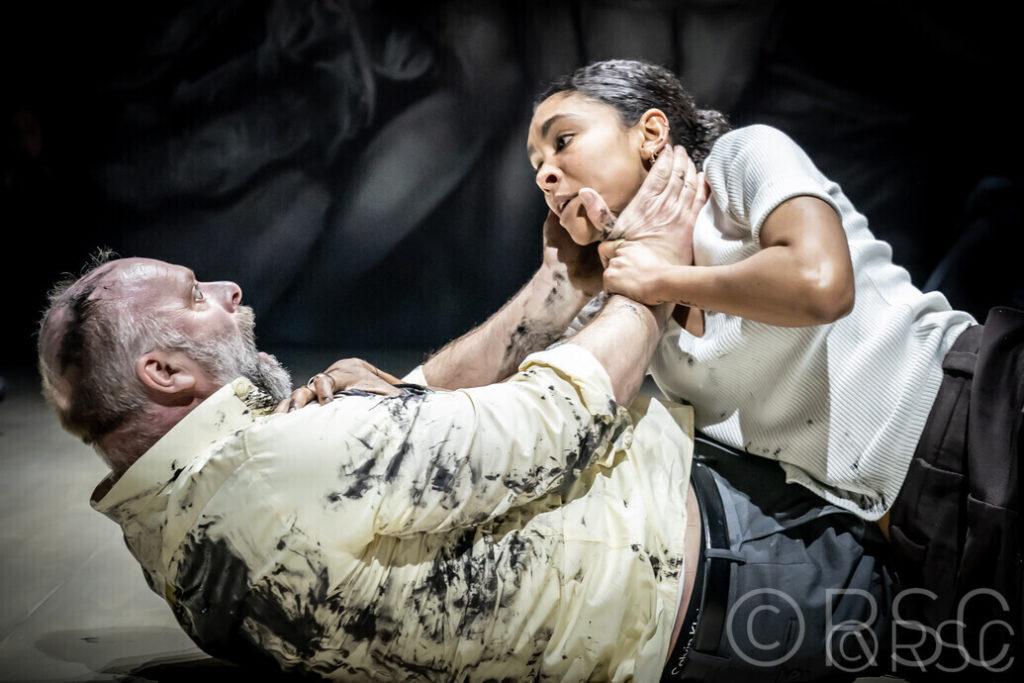
FRIENDS, readers, Yorkshiremen, lend me your time; I come neither to bury Atri Banerjee’s Julius Caesar, nor to praise it.
Recruited to direct Shakespeare’s political thriller through the Royal Shakespeare Company’s Open Hire initiative “to improve transparency and access to freelance creative jobs in theatre”, Banerjee brings his South Asian heritage to a production of global scope, one where he plays with gender identity too, as well as playing with the artform of theatre.
A play is called a play because it is an act of play, one that gives free rein to artistic expression and interpretation refracted through present times. In our case, Covid, #MeToo, Black Lives Matter, Trump, the climate crisis, three Conservative Prime Ministers in a matter of months, and progression from LGBT to LGBTQIA+.
Some reactions have suggested that Banerjee is playing with his audience, from his warm-up exercise crowd-opening with all the opera-sized RSC cast running on the spot and howling, to casting Brutus (Thalissa Teixeira), Cassius (initially Kelly Gough, now the non-binary Annabel Baldwin) and Octavius Caesar (Ella Dacres) as women, to a ghostly Caesar (Nigel Barrett) waving insouciantly at Brutus.
You could argue that Banerjee is playing instead with audience expectations, in a case of when in Rome, don’t do as the Romans do, by taking on the po-faced antediluvians who think such a serious play should be taken more seriously, because politics is no laughing matter, although any number of political sketches by John Crace or Marina Hyde’s columns in the Guardian counter that view.
What’s more, Banerjee is being serious, very serious, if modish in his delivery, in asking the big question: how far would you go for your principles?
Presented as part of the RSC’s Power Shifts season, Julius Caesar reflects how political change appears to be happening ever faster, (although despotic leaders have a way of re-writing the rule books – or commandeering the ballot box – to allow themselves to stay in power).
This week alone, Italy has come to bury – and reappraise – the first of the modern wave of populist leaders, Silvio Berlusconi, while another, Boris Johnson, has had his political career buried underneath a stinking mound of lies about lying.
Julius Caesar was the populist ruler of his time, here played in casual shirt sleeves by Barrett with rather more commanding order to his delivery of the blank verse. His crime, as William Robinson’s Marc Antony ascribes four times to Brutus, is ambition. Yet Marc Antony calls Brutus “honourable”, just as Othello calls Iago “honest” and Macbeth is praised for his valour and worthiness. Vaulting ambition did for him too, of course.
Misjudgements may have proliferated in modern politics, our age of narcissistic frontmen, but this is no longer the age of lies, damn lies and statistics, or truths and half-truths, but “alternative truths” and “post-truths”.
Caesar was a “divisive ruler”: he surely would have thrived in our era of divide-and-rule leaders, nourished by an equally divisive media in print, on screen and on air. In his time, however, he was removed, despatched, without a plan of what might come next, other than a craving for a “better future”. (Don’t all politicians say that when first entering the House of Commons before the Whip-cracking and corruptive need to keep power take over?)
Death after death, as it turns out, is the result here, all gathered in what has become known flippantly as the “ghost bus” on Rosanna Vize’s revolving stage. At that point, they are restored to clean clothing, whereas those assassins still alive are still stained by Caesar’s blood, here black and sticky as newsprint rather than red.
Those death blows had been applied in smearing actions, rather than as 33 stab wounds, to be followed by a PAUSE, announced in big letters, accompanied by a two-minute countdown before Caesar’s exit, taking almost long as an opera death by aria. This would be one of those moments that has made Banerjee’s Julius Caesar as divisive as the ruler himself,
It finds its echo in the INTERVAL countdown on screen, 20 minutes ticking by to the mournful repetitive sound of a single trombone: in keeping with the sombre mood, or irritating, depending on how you reacted to the 90-minute first half. Or, maybe, a sonic tool that theatres could use in future to drive customers to the bar.
Banerjee’s “Do you bite your thumb at us, sir?” style of production is full of ideas: the Caesar wave; the rising multitude of ghosts, giving a sense of time running out; Joshua Dunn’s Cinna the Poet re-emerging all in ashen grey after his death; the use of a York community chorus (Hilary Conroy, Astrid Hanlon, Elaine Harvey, Stephanie Hesp, Anna Johnston and Frances Simon, under Jessa Liversidge’s musical direction), only to employ them rather less than a traditional Greek chorus role; not enough ill wind in their sails.
Better is the casting of the power seekers as young, like the Blair intake in 1997, still learning the political ropes and prone to mistakes and rash judgements. You will enjoy the nods to Dominic Cummings and Malcolm Tucker in Matthew Bulgo’s administrator, Casca.
Frustrations? Why does Teixeira’s Brutus not find her footing until deep in the mire? Why is Niamh Finlay playing the Soothsayer in red tracksuit bottoms with juddering, jagged dance movements like Happy Mondays’ Bez, as if three Macbeth witches trapped in one body?
Why, after making much of changing the gender dynamics of Julius Caesar’s world, does Antony’s eulogy to Brutus still conclude: “This was a man”? Ask Atri! He may be making a point about women having to mirror men to fit in, to succeed.
Ultimately, in the play for power, will we ever decide that Brutus was right: “Good words are better than bad strokes”?
Royal Shakespeare Company in Julius Caesar, York Theatre Royal, 7.30pm tonight plus 2pm Saturday matinee. Box office: 01904 623568 or yorktheatreroyal.co.uk
